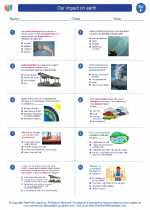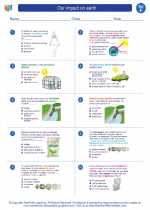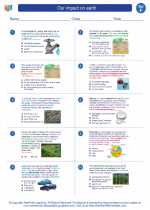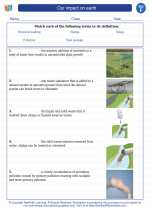Our impact on earth -> corrosion
Corrosion
Corrosion is the process by which metal deteriorates as a result of a chemical reaction with its environment. This is typically an electrochemical process, which means it involves the transfer of electrons between different substances. Corrosion can have detrimental effects on the appearance, strength, and structure of metal objects and can lead to their eventual failure. Understanding the causes and prevention of corrosion is important in various industries, including construction, manufacturing, and infrastructure maintenance.
Causes of Corrosion
The most common form of corrosion is rusting, which occurs when iron or steel reacts with oxygen and water. This reaction forms iron oxide, a reddish-brown compound that weakens the metal's structure. Other metals can also corrode when exposed to specific environmental conditions. Factors that contribute to corrosion include:
- Moisture: Water is a key component in many corrosion reactions, as it facilitates the movement of ions between the metal and its environment.
- Oxygen: The presence of oxygen in the air or water is necessary for the formation of many types of corrosion, including rusting.
- Acids and salts: These substances can accelerate corrosion by increasing the rate of chemical reactions with the metal surface.
- Temperature: Higher temperatures can often lead to faster corrosion processes.
Prevention of Corrosion
There are several methods to prevent or slow down the process of corrosion, including:
- Protective coatings: Applying paints, varnishes, or other coatings to metal surfaces can create a barrier that prevents contact with corrosive substances.
- Galvanization: Coating iron or steel with a layer of zinc can protect the metal from corrosion, as the zinc serves as a sacrificial anode that corrodes instead of the iron or steel.
- Alloying: Mixing metals to create alloys can improve their resistance to corrosion. For example, stainless steel contains chromium, which forms a protective oxide layer that inhibits further corrosion.
- Cathodic protection: This method involves connecting the metal to a more easily corroded "sacrificial" metal, such as magnesium or zinc, to divert the corrosion away from the protected metal.
Effects of Corrosion
Corrosion can have significant impacts on both the appearance and functionality of metallic objects. Some of the effects of corrosion include:
- Structural weakening: Corrosion can reduce the thickness of metal structures, leading to potential collapse or failure.
- Financial costs: The repair or replacement of corroded structures and equipment can be expensive.
- Environmental impact: Corrosion can lead to the release of toxic substances into the environment, posing risks to ecosystems and human health.
Study Guide
When studying corrosion, it is important to understand the different types of corrosion, the factors that contribute to its occurrence, and the methods used to prevent or mitigate it. Key topics to focus on include:
- Types of corrosion (e.g., rusting, pitting, galvanic corrosion)
- Environmental factors that influence corrosion
- Methods of corrosion prevention and protection
- The impact of corrosion on structures, equipment, and the environment
Additionally, conducting experiments or case studies related to corrosion can provide practical insights into its causes and effects. Understanding the role of electrochemistry in corrosion processes is also essential for a comprehensive grasp of the topic.
Remember to practice identifying real-world examples of corrosion and evaluating the effectiveness of different corrosion prevention strategies. This will help solidify your understanding of the subject and its practical applications.
.◂Science Worksheets and Study Guides Sixth Grade. Our impact on earth

 Worksheet/Answer key
Worksheet/Answer key
 Worksheet/Answer key
Worksheet/Answer key
 Worksheet/Answer key
Worksheet/Answer key
 Vocabulary/Answer key
Vocabulary/Answer key
